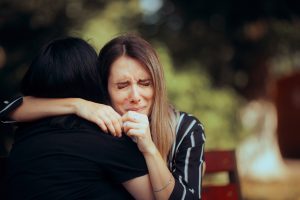 Written by Paul J. Moon, Ph.D, M.ED, BA, GC-C, FAAGC,
Written by Paul J. Moon, Ph.D, M.ED, BA, GC-C, FAAGC,
Grief is a human response to loss. When we sense loss, we can grieve.
Human grief has been referred to as the quintessential mind-body problem (see Genevro et al., 2004 for more), suggesting a holistic impact. As such, when we grieve, various emotions can well up and also fluctuate in us, sometimes drastically, unpredictably, surprisingly so. When we grieve our sleep cycle can be disturbed: some mourners sleep more than usual while others struggle to rest. We might find ourselves becoming easily (and uncharacteristically) irritated, confused, or forgetful. When we grieve we may even get tired of being around people (or certain people) at times. In grief, we can crave solitude and find some solace in being alone, being quiet. On the other hand, some of us in grief may prefer to have company more often than less.
Of course, there is sorrow and sadness that accompany grief. Sadness may involve tearfulness, but not always. We may also have our appetite to teeter: some of us may tend to overeat when in grief distress, while others of us go on a ‘hunger strike’, as it were. Moreover, our immune system can be weakened for a span of time, making us feel sapped of energy and vulnerable to illnesses. All these can be a part of grief.
Strangely enough, for some mourners, there can also be a sense of relief in the midst of sorrow. This can be a bit unsettling as it doesn’t feel like it fits with what grief ‘ought’ to be like. But sensing relief amid the pain of loss can be a part of grief. Human grief is rather complex.
Now, there’s a particularly important point to consider, and that is regarding individual differences. This means that not all human beings share identical grief responses. This makes sense as it is the individual who grieves: grieving is never separate from the individual-person who is enduring loss. As no two persons are precisely alike, grief, too, will be experienced differently to varying degrees from person to person.
So why is the point of personal differences so important to keep in mind? It is because we must take care to not judge another person’s grief experience. Pain (whether physical, psychological, or spiritual in nature) is a terribly personal – subjective – matter. There is no way I can truly know another person’s grief pain, just as there is no way for me to expect another person to truly know the grief pain that rages inside of me. It’s hard enough to really know one’s own grief, let alone know someone else’s. So being patient with other grievers is a virtue. It is a virtue we can only hope others would exercise towards us when we are grieving.
Author Biography:
Dr. Paul Moon is an instructor with AIHCP and you can review all of his credentials at the following link: Access here.
Reference.
Genevro, J. L., Marshall, T., Miller, T., & Center for the Advancement of Health. (2004). Report on bereavement and grief research. Death Studies, 28(6), 491–491.
Please also review AIHCP’s Grief Counseling Certification program and see if it meets your academic and professional goals. These programs are online and independent study and open to qualified professionals seeking a four year certification.
